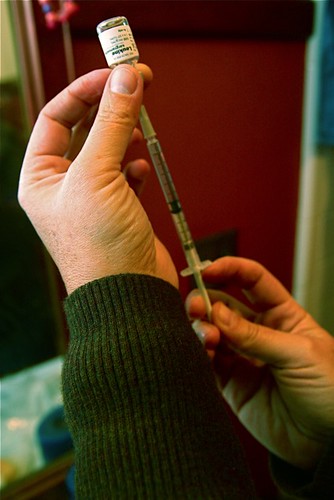 There is no evidence that giving certain vaccinations to children under two years of age causes them to develop autism, according to a new study published in the Journal of Pediatrics.
There is no evidence that giving certain vaccinations to children under two years of age causes them to develop autism, according to a new study published in the Journal of Pediatrics.
The findings, released online last Friday, reinforce those of other studies over the last several years by the Institute of Medicine and the Centers for Disease Control and Prevention, and underscore what child health organizations, including the American Academy of Pediatrics, have said for years in response to parental fears.
This latest study evaluated concerns by parents that infants and toddlers received too many vaccines at one time if they followed the immunization schedule recommended by the Centers for Disease Control and Prevention (CDC). Many parents have been nervous about exposing their children to multiple vaccines at one time from a very young age.
Researchers compared a group of 256 children who were diagnosed with an autism spectrum disorder to a group of 752 children who did not have autism. They found that the both groups had the same number of antigens, or antibodies, developed in response to vaccines.
The group of children who had regressed in development by their second year of age – a sign of autism — did not show a greater number of vaccine antigens than the second group of children who had not regressed in development, the study found.
Even though the actual number of vaccines in the recommended immunization schedule has gone up, the number of antigens children produce as a result has fallen drastically, from several thousand antigens in the late 1990s to about 315 this year, the study found. That’s because vaccines are now made differently and stimulate fewer antigens, the CDC said.
Autism rates among children have risen dramatically in the last few years. About one in every 88 children is diagnosed with autism, according to the CDC, a 78-percent increase since its first report on autism prevalence rates in 2007.
The CDC attributes the increase in part to improved awareness of autism on the part of educators and medical professionals, leading to better diagnoses for children. It admits, however, that more research is required into the reasons behind these rising rates.
Parental fears about autism were first fanned by a 1998 article in the British medical journal The Lancet, which cited a study of 12 children to suggest a link between autism and the childhood vaccine for measles, mumps and rubella.
In the years afterward, 10 of the report’s 13 authors withdrew the claims made in the article, according to the CDC. In 2010, The Lancet retracted the entire article.
But the worries the article introduced about the effects of vaccines have lingered, and as a result, vaccination rates for children have stagnated or even dropped.
The proportion of two-year-olds receiving all CDC-recommended vaccines did not change between 2004 and 2011, according to the research center Child Trends.
Several child health organizations have attempted to set the record straight, concerned about the public health ramifications of falling vaccination rates for children.
“Studies conducted in the U.S. and Europe have found no association between the MMR vaccine and autism,” states the American Academy of Pediatrics. “Over the years, the Institute of Medicine and the AAP have organized several panels of independent scientists – all concluded that there is no association between MMR and autism.”
Photo by stevendepolo | Flickr



























